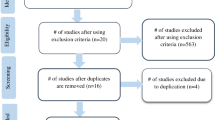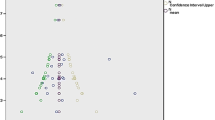Abstract
Computerized learning environments offer several possibilities that can be used to improve the teaching of content along with the process. Research indicates that students benefit from additional guidance, particularly when computer-based instruction requires active construction of knowledge. This study examines the relative effectiveness of guided versus unguided computer-based instruction with respect to regular instruction in improving content knowledge and process skills among students with low and high chemistry achievement levels. The results indicate that the effectiveness of computer-based instruction increases when learning is supported by teacher-directed guidance. Computer-based instruction (with or without guidance) was observed to be more effective than regular instruction in improving process skills particularly for students with high chemistry achievement. However, although the students who received regular or guided computer-based instruction showed significant gains in content knowledge, students under unguided condition failed to construct the expected content knowledge.
Similar content being viewed by others
REFERENCES
Adey, P. S., Shayer, M., and Yates, C. (1995). Thinking Science, 2nd ed., Thomas Nelson & Sons, London.
Berger, C. F., Lu, C. R., Belzer, S. J., and Voss, B. E. (1994). Research on the use of technology in science education. In Gabel, D. L. (Ed.), Handbook of Research on Science Teaching and Learning, Simon and Schuster, New York, pp. 466–490.
de Jong, T., and van Joolingen, W. R. (1998). Scientific discovery learning with computer simulations of conceptual domains. Review of Educational Research 63: 179–201.
Fisher, B. W. (1997). Computer modeling for thinking about and controlling variable. School Science Review 79: 87–90.
Friedler, Y., Nachmias, R., and Linn, M. C. (1990). Learning scientific reasoning skills in micro-computer based laboratories. Journal of Research in Science Teaching 27: 173–192.
Graef, J. (1984). Teaching science with computers. Physics Teacher 22: 430–436.
Holliday, W. G., and McGuire, B. (1992). How can comprehension adjunct questions focus students' attention and enhance concept learning of a computer-animated science lesson? Journal of Research in Science Teaching 29: 3–16.
Kircshner, P. A., and Huisman, W. (1998). “Dry laboratories” in science education: Computer-based practical work. International Journal of Science Education 20: 665–682.
Lawson, A. E. (1995). Science Teaching and The Development of Thinking, Wardsworth, California.
Lazarowitz, R., and Huppert, J. (1988). Computer assisted learning in biology: Students achievement by gender and cognitive levels. In Lovis, F., and Tagg, E. D. (Eds.), Computers in Education, Elsevier, Amsterdam, pp. 589–597.
Leonard, W. H. (1990). Computer-base technology in college science laboratory courses. Journal of College Science Teaching 19: 210–211.
Leutner, D. (1993). Guided discovery learning with computerbased simulation games: Effects of adaptive and non-adaptive instructional support. Learning and Instruction 3: 113–132.
Lin, X., and Lehman, J. D. (1999). Supporting learning of variable control in a computer-based biology environment: Effects of prompting college students to reflect on their own thinking. Journal of Research in Science Teaching 36: 837–858.
Lunneta, V., and Hofstein, A. (1981). Simulation in Science Education. Science Education 65: 243–252.
Marks, G. H. (1982). Computer simulations in science teaching: An introduction. Journal of Computers in Mathematics and Science Teaching 1: 18–20.
Mintz, R. (1993). Computerized simulation as an inquiry tool. School Science and Mathematics 93: 76–80.
Mokros, J. R., and Tinker, R. F. (1987). The impact of microcomputer-based labs on children's ability to interpret graphs. Journal of Research in Science Teaching 24: 369–383.
Njoo, M., and deJong, T. (1993). Exploratory learning with a computer simulation for control theory: Learning processes and instructional support. Journal of Research in Science Teaching 30: 821–844.
Plomp, T., and Voogt, J. (1995). Use of computers. In Fraser, B. J., and Walberg, H. J. (Eds.), Improving Science Education, The University of Chicago Press, Chicago, pp. 171–185.
Reiser, B. J., Cohen, W. A., Hamid, A., and Kimberg, D. Y. (1993). Cognitive and Motivational Consequences of Tutoring and Discovery Learning, Northwestern University Press, Evanston, Illinois.
Rivers, R. H., and Vokell, E. (1987). Computer simulations to stimulate scientific problem solving, Journal of Research in Science Teaching 24: 403–415.
Swaak, J., and de Jong, T. (1996). Measuring intuitive knowledge in science: Development of the WHAT-IF test. Studies in Educational Evaluation 22: 341–362.
Swaak, J., van Joolingen, W. R., and de Jong, T. (1998). Supporting simulation-based learning: The effects of model progression and assignments on definitional and intuitive knowledge. Learning and Instruction 8: 235–252.
Tobin, K., Kahle, J. B., and Fraser, B. J. (1990). Windows into Science Classrooms: Problems Associated with Higher-Level Cognitive Learning, Falmer Press, London.
Author information
Authors and Affiliations
Rights and permissions
About this article
Cite this article
Ardac, D., Sezen, A.H. Effectiveness of Computer-Based Chemistry Instruction in Enhancing the Learning of Content and Variable Control Under Guided Versus Unguided Conditions. Journal of Science Education and Technology 11, 39–48 (2002). https://doi.org/10.1023/A:1013995314094
Issue Date:
DOI: https://doi.org/10.1023/A:1013995314094




